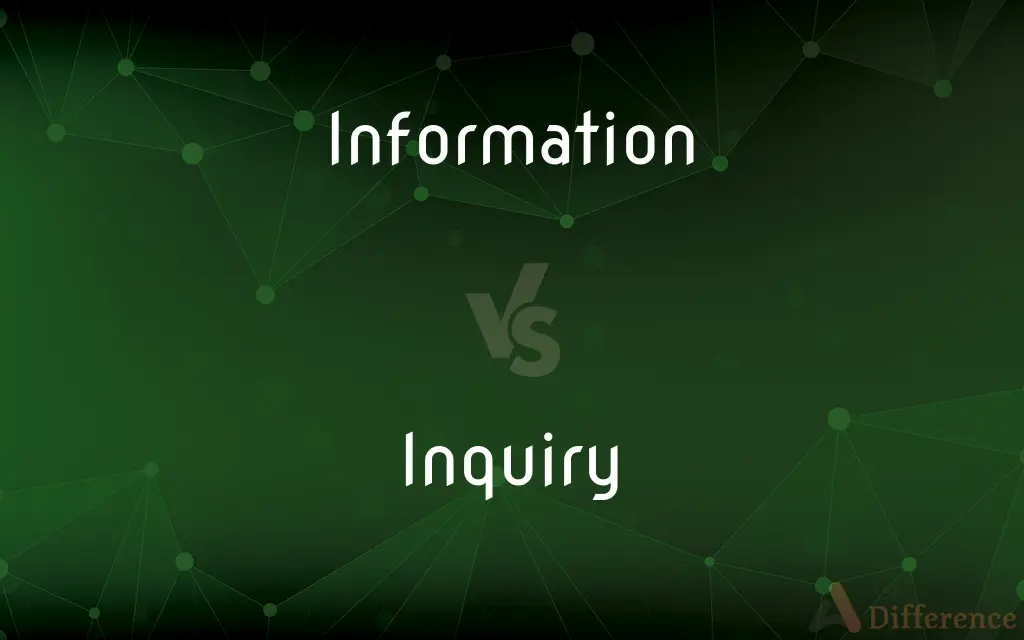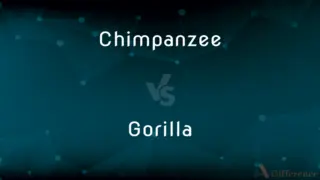Information vs. Inquiry — What's the Difference?
By Tayyaba Rehman & Urooj Arif — Updated on March 15, 2024
Information involves data or facts provided or learned about something or someone, while inquiry is a process of seeking facts, information, or knowledge through questions.

Difference Between Information and Inquiry
Table of Contents
ADVERTISEMENT
Key Differences
Information typically refers to processed data, facts, or details that have been organized and presented in a way that adds meaning or context. On the other hand, inquiry is the act of asking for information. It is a process that involves questioning, exploring, or investigating to gain understanding or knowledge.
While information serves as a resource or input for learning, decision-making, or problem-solving, inquiry is the method or process through which information is sought or obtained. Information answers questions and provides clarity, whereas inquiry is the act of posing questions and seeking out information.
Inquiry often leads to the discovery of new information or the deepening of understanding, emphasizing the dynamic nature of learning and knowledge acquisition. Information, once established, remains static until new data or analysis updates it. Inquiry, by its nature, is a continuous and ongoing process.
Both information and inquiry are crucial in the pursuit of knowledge. Information provides the foundation upon which inquiries are based, and inquiry, in turn, generates new information, fostering a cycle of learning and understanding.
Comparison Chart
Definition
Processed data or facts organized for understanding.
The act of seeking or asking for information, knowledge, or truth.
ADVERTISEMENT
Purpose
To inform, educate, or provide insight.
To investigate, explore, or ask questions.
Nature
Static, until updated with new data or analysis.
Dynamic and ongoing process.
Role
Serves as input for decision-making or learning.
Generates new information through questioning or investigation.
Outcome
Provides clarity, answers, and resolution.
Leads to discovery, understanding, or further questions.
Compare with Definitions
Information
Information is processed data that has been organized and presented to provide meaning.
The book provided information on the country's history.
Inquiry
Inquiry is the act of asking questions to gain information or understanding.
His inquiry into the system's operation revealed its complexity.
Information
Information is stored, processed, and transmitted by computers.
The database holds information on all registered users.
Inquiry
Used to diagnose or explore solutions.
The technician’s inquiry into the issue identified a simple fix.
Information
Considered valuable in various fields for analysis and insight.
Market information helps businesses strategize.
Inquiry
It's a fundamental component of scientific and academic research.
The study began with an inquiry into the effects of pollution.
Information
It serves as a basis for communication and decision-making.
The manager used the financial information to make budget cuts.
Inquiry
Encourages active learning by asking questions.
Inquiry-based learning fosters critical thinking.
Information
Information is the core of learning materials.
Online articles are a quick source of information on current events.
Inquiry
Involves seeking, questioning, and investigating.
Her inquiry into her family history took her to several archives.
Information
Information can be thought of as the resolution of uncertainty; it answers the question of "What an entity is" and thus defines both its essence and the nature of its characteristics. The concept of information has different meanings in different contexts.
Inquiry
An inquiry (also spelled as enquiry in British English) is any process that has the aim of augmenting knowledge, resolving doubt, or solving a problem. A theory of inquiry is an account of the various types of inquiry and a treatment of the ways that each type of inquiry achieves its aim.
Information
Knowledge or facts learned, especially about a certain subject or event.
Inquiry
The act of inquiring
Engaged in scientific inquiry.
Information
The act of informing or the condition of being informed; communication of knowledge
Safety instructions are provided for the information of our passengers.
Inquiry
A question; a query
There were many inquiries about the new tax rates.
Information
(Computers) Processed, stored, or transmitted data.
Inquiry
A close examination of a matter
A Congressional inquiry into the scandal.
Information
A numerical measure of the uncertainty of an experimental outcome.
Inquiry
The act of inquiring; a seeking of information by asking questions; interrogation; a question or questioning.
Information
(Law) A formal accusation of a crime made by a public officer rather than by grand jury indictment in instances in which the offense, if a federal crime, is not a felony or in which the offense, if a state crime, is allowed prosecution in that manner rather than by indictment.
Inquiry
Search for truth, information, or knowledge; examination of facts or principles; research; investigation
Scientific inquiry
Information
That which resolves uncertainty; anything that answers the question of "what a given entity is".
Inquiry
The act of inquiring; a seeking for information by asking questions; interrogation; a question or questioning.
He could no path nor track of foot descry,Nor by inquiry learn, nor guess by aim.
The men which were sent from Cornelius had made inquiry for Simon's house, and stood before the gate.
Information
Things that are or can be known about a given topic; communicable knowledge of something.
I need some more information about this issue.
Inquiry
Search for truth, information, or knowledge; examination into facts or principles; research; investigation; as, physical inquiries.
All that is wanting to the perfection of this art will undoubtedly be found, if able men . . . will make inquiry into it.
Information
The act of informing or imparting knowledge; notification.
For your information, I did this because I wanted to.
Inquiry
A search for knowledge;
Their pottery deserves more research than it has received
Information
A statement of criminal activity brought before a judge or magistrate; in the UK, used to inform a magistrate of an offence and request a warrant; in the US, an accusation brought before a judge without a grand jury indictment.
Inquiry
An instance of questioning;
There was a question about my training
We made inquiries of all those who were present
Information
(obsolete) The act of informing against someone, passing on incriminating knowledge; accusation.
Inquiry
A systematic investigation of a matter of public interest
Information
The systematic imparting of knowledge; education, training.
Information
The creation of form; the imparting of a given quality or characteristic; forming, animation.
Information
[…] the meaning that a human assigns to data by means of the known conventions used in its representation.
Information
(Christianity) Divine inspiration.
Information
A service provided by telephone which provides listed telephone numbers of a subscriber.
Information
(information theory) Any unambiguous abstract data, the smallest possible unit being the bit.
Information
As contrasted with data, information is processed to extract relevant data.
Information
(information technology) Any ordered sequence of symbols (or signals) (that could contain a message).
Information
The act of informing, or communicating knowledge or intelligence.
The active informations of the intellect.
Information
Any fact or set of facts, knowledge, news, or advice, whether communicated by others or obtained by personal study and investigation; any datum that reduces uncertainty about the state of any part of the world; intelligence; knowledge derived from reading, observation, or instruction.
Larger opportunities of information.
He should get some information in the subject he intends to handle.
Information
A proceeding in the nature of a prosecution for some offense against the government, instituted and prosecuted, really or nominally, by some authorized public officer on behalf of the government. It differs from an indictment in criminal cases chiefly in not being based on the finding of a grand jury. See Indictment.
Information
A measure of the number of possible choices of messages contained in a symbol, signal, transmitted message, or other information-bearing object; it is usually quantified as the negative logarithm of the number of allowed symbols that could be contained in the message; for logarithms to the base 2, the measure corresponds to the unit of information, the hartley, which is log210, or 3.323 bits; called also information content. The smallest unit of information that can be contained or transmitted is the bit, corresponding to a yes-or-no decision.
Information
Useful facts, as contrasted with raw data; as, among all this data, there must be some interesting information.
Information
A message received and understood
Information
A collection of facts from which conclusions may be drawn;
Statistical data
Information
Knowledge acquired through study or experience or instruction
Information
(communication theory) a numerical measure of the uncertainty of an outcome;
The signal contained thousands of bits of information
Information
Formal accusation of a crime
Common Curiosities
Can inquiry exist without information?
Inquiry can initiate without specific information but seeks to discover or generate new information through its process.
Is all information a result of inquiry?
Much of the information is a result of inquiry, but some information can also be obtained through observation, experimentation, or documentation without a direct inquiry.
What is the main difference between information and inquiry?
Information is processed data that provides meaning, while inquiry is the act of seeking information through questions.
What role does technology play in information and inquiry?
Technology facilitates the storage, processing, and retrieval of information, and provides tools that enhance the inquiry process through access to vast resources.
Can information change over time?
Yes, as new data is collected and analyzed, information can be updated, revised, or expanded.
What is an example of inquiry leading to new information?
A scientific research study asking about the effects of a new drug can lead to new information about its efficacy and safety.
How important is inquiry in the learning process?
Inquiry is crucial for the learning process as it encourages critical thinking, exploration, and the active pursuit of knowledge.
How does inquiry benefit decision-making?
Inquiry provides a methodical way to gather relevant information and insights, enabling more informed and effective decisions.
How do information and inquiry work together?
Inquiry involves asking questions to obtain information, which then can be used to further inquiries, creating a cyclical process of learning.
Is inquiry always formal?
No, inquiry can be both formal, as in academic research, or informal, such as everyday questions about one’s surroundings.
Why is information considered a valuable resource?
Information is valuable because it enables understanding, decision-making, and strategy development across various contexts.
How does inquiry relate to curiosity?
Inquiry is driven by curiosity, the desire to know more about something, leading to questions and exploration.
How do educational institutions promote inquiry?
Through inquiry-based learning strategies, encouraging students to ask questions, explore, and engage actively with the material.
What is the relationship between information and knowledge?
Information becomes knowledge when it is understood, applied, or integrated into one's existing knowledge base.
Can too much information hinder the inquiry process?
Yes, information overload can complicate the inquiry process, making it difficult to identify relevant data or insights.
Share Your Discovery

Previous Comparison
Chiropractor vs. Osteopath
Next Comparison
Chimpanzee vs. GorillaAuthor Spotlight
Written by
Tayyaba RehmanTayyaba Rehman is a distinguished writer, currently serving as a primary contributor to askdifference.com. As a researcher in semantics and etymology, Tayyaba's passion for the complexity of languages and their distinctions has found a perfect home on the platform. Tayyaba delves into the intricacies of language, distinguishing between commonly confused words and phrases, thereby providing clarity for readers worldwide.
Co-written by
Urooj ArifUrooj is a skilled content writer at Ask Difference, known for her exceptional ability to simplify complex topics into engaging and informative content. With a passion for research and a flair for clear, concise writing, she consistently delivers articles that resonate with our diverse audience.















































